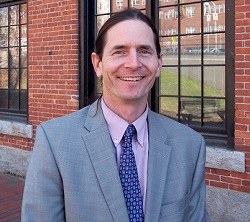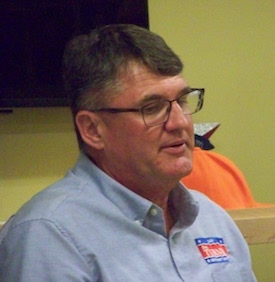GREENSBORO, Vt. — A debate Thursday between Democratic Lt. Gov. David Zuckerman and Republican state Rep. Don Turner gave voters a final chance to decide who they want to be second-in-command in Vermont for the next two years.
The debate, moderated by VTDigger’s Anne Galloway, was held at the new Highland Center for the Arts. Questions to the candidates, posed by Galloway, were submitted by VTDigger readers in advance of the debate.
While both candidates maintained a civil, gentlemanly exchange, they had ample time to demonstrate their sharp political differences.
Questions for candidates included whether they support the $15 minimum wage, what to do about climate change and a carbon tax, are school mergers under Act 46 a good or bad thing, should there be tax incentives for fire and rescue volunteers, and what about mandatory vaccines for school children.
The first of the reader questions posed by Galloway presented the candidates with the idea of a carbon tax as a means to reduce the use of fossil fuels within the state.

Lt. Gov. David Zuckerman
In a pre-debate coin toss, Zuckerman, a resident of Hinesburg, was the first to respond to a question about using a carbon tax to reduce reliance on fossil fuels for energy.
“Two years ago, during the night that I was elected, when I should have been jubilant and happy, I was horror-struck by the national nightmare that was unfolding before us,” Zuckerman said, referring to the election of Republican President Donald trump. “I thought about my 10-year-old daughter … (and) two issues (came to mind): climate change and the Supreme Court. And over these two years we have seen horrific regression in both of those counts.”
He continued: “Yes, I do support a carbon dividend … so long as there are adjustments to be made for rural, long-distance commuters and working class and poor individuals who would be hard affected by a regressive tax.”
Zuckerman said a recent United Nations Intergovernmental Panel on Climate Change Report report was “very frightening and damning” as it relates to the warming of oceans and its possible result of stronger hurricanes “if we don’t keep a goal like the 90 percent rule by 2050, which my opponent said in another debate he does not support.”
While Turner, a resident of Milton, said he accepts climate change as real science, he opposes a carbon tax as being far too regressive.
“No, I do not support a carbon tax of any shape or form,” Turner responded. “I do believe the science that talks about global warming and I do believe that Vermont is making a difference in the way we’ve invested and we’ve passed laws (regarding) renewable energy.

State Rep. Don Turner, R-Milton
“I am concerned that the 90 percent goal by 2050 is unrealistic, but I believe that we (can) continue to strive in this way with a more realistic goal of 50 to 75 percent by that time. … I fully support expanding renewable energy.”
Galloway asked a follow up question: “If not a carbon tax, then what?” She said the IPCC report has concluded that carbon taxes are the only way to change human behavior.
“I do not support it, Anne, and I will not support a tax,” Turner said. “I understand the report. But I have also traveled the state all summer long talking to Vermonters who can’t afford to stay here. … This is a crisis we have to deal with now.”
Zuckerman replied by saying that a carbon tax is possible without hurting low income and working Vermonters.
“We need vision — this idea that it is jobs and affordability versus the environment and climate change is not a visionary response,” he said. “A visionary response is looking at how many jobs we’ve created doing both at the same time. … The goal of 90 by ‘50 is totally attainable.”
Turner wasn’t convinced by Zuckerman’s response.
“Even if we doubled what we have achieved to date, David, we’d only be at 40 percent. So it’s going to take another 32 years to get to 40 percent. I am not sure how we’d get to 90 percent,” he said.
If the candidates also expressed sharp differences on a question about raising the minimum wage to $15.
“(As a farmer) this year our base pay for our workers was $12.83 an hour — it’s equivalent to $15 an hour in the 2024-year if the bill (we proposed) hadn’t been vetoed by the governor,” Zuckerman said.
“I do support raising it to $15. We’ve seen a 40-year decline in working peoples’ wages … under Reagan trickle-down economics, which I call sponge-up economics. We have the greatest concentration of wealth in wealthy peoples’ hands today than before the (2008) stock crash. … We have a 10,000 person shortage in employees in the state now.”
Turner explained that while he supported a minimum wage increase three years ago, he can’t support a hike to $15.
“I did not support the $15 minimum wage,” he replied. It’s well-intentioned but it has many negative consequences,” he said. “According to our legislative economist, it would cost thousands of jobs, reduce hours of people that are working for that wage … (and) raise prices.”
He added that 2,000 families would “fall off the benefits cliff,” meaning they would lose significant welfare benefits if they earned a little more money.
“On top of that,” Turner continued, “we’d see a cost-increase to state government, higher education, and our non-profits. Ninety percent of all Vermont businesses have 20 or fewer employees. … We should be investing in workforce development programs instead of artificially increasing the minimum wage.”
On the divisive issue of forced school-district mergers across Vermont as a result of Act 46, the candidates were asked about their positions on it, and if it makes sense to merge award-winning schools with poorly performing schools.
Turner said he voted “yes” for Act 46 a few years ago because it offered cost containment on education. But he added that since the summer months, he has started to rethink some ideas, especially regarding some special cases of forced mergers.
“In Franklin, at the time when I was voting on Act 46, I had no idea of what was going on there,” he said. “I’ve learned since that they have a small but great school district, they received an award from the Agency of Education less than two years ago about excellence in education, and they also spend 10 percent less than their neighboring school districts they are (being) forced to merge with. … They shouldn’t be forced to merge with districts which are not providing the best student outcomes and costing more.”
He suggested taking “a time out on these forced mergers.”
Zuckerman, having been a member of the House Education Committee, said that he doesn’t support all forced mergers. He contrasted himself with Turner’s later change of heart by stating that better understood Act 46 from the beginning.
“Frankly, we knew there’d be 30 or 40 districts in the state that it probably wouldn’t work for,” Zuckerman said. “… If it doesn’t work for any number of reasons then the State Board of Education should grant an off ramp for schools that are doing a good job. … The state board is not following the intent as we wrote it into law.”
On gun control, both candidates appeared to agree that weapons should be taken away from individuals with both a history of domestic abuse and mental health problems.
On state-mandated vaccinations, Zuckerman sided with leaving the choice to parents while Turner strongly defended mandatory vaccines for Vermonters.
RELATED: Lt. Gov. Zuckerman raises mandatory vaccination issue during debate
Zuckerman took on a question about vaccines in light of speculative Lyme disease treatments. He also echoed reports alleging that the CDC has conflicts of interest regarding the recommendation of various vaccines nationwide.
Keeping to the clock, moderator Anne Galloway wrapped up the debate at the one-hour mark. The candidates shook hands and left the stage of Greensboro’s arts center.
However, the dispute over vaccinations led Turner to issue a press release on the topic Friday.
“My opponent … said that, ‘the CDC’s Infectious Disease Control board has a number of conflicts of interests, both researching vaccines for Lyme as well as connections with the pharmaceutical industry.’ I am extremely disappointed to hear my opponent not only reiterate his position, which is rejected by the experts on this issue, including the American Academy of Family Physicians, but also to question the role of the pharmaceutical industry in influencing the CDC,” Turner said in the press statement.
He added that if Zuckerman has “demonstrable proof that the CDC’s decisions or actions are influenced by the pharmaceutical industry, he should disclose that evidence.”
Lou Varricchio is a freelance reporter for True North Reports. Send him news tips at lvinvt@gmx.com.



Lt Governor Zuckerman, what can one say he lives in his Progressive Utopia !!
He hits all the talking points with the same BS as the other Progressive DemocRATs,
so hold on to your wallet …….
If you drive a Prius and plug into the Free Charging Stations the state supplies, it’s just
another utopia for saving the planet !! Where do these fools think the free energy comes
from ……. It’s coal or wood-fired or oil-fired Generators !!……….
The Zuck said only one thing I fully agree with: Parental control/consent re vax inoculations. Otherwise he’s totally in Leftist field.
Turner doesn’t seem to be really in tune with the firearms thing and especially the vaccines subject that has much study that backs up second, even third, examinations of the ill effects of their use.
Neither one seems tuned in re the stupidity and ramifications of a Carbon Tax. This contest’s voting will unfortunately follow party politics and the hippie dude will get another term.